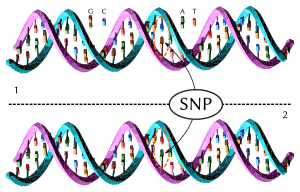Single nucleotide polymorphism facts for kids
A single nucleotide polymorphism (pronounced snip), often called a SNP, is a tiny difference in our DNA. Imagine your DNA as a long instruction book. A SNP is like a single letter change in that book. These small changes happen in the DNA sequence of a group of people.
For example, if one person's DNA reads AAGCCTA and another person's DNA reads AAGCTTA, that single 'C' changing to a 'T' is a SNP. When there are two different versions like this, we call them alleles. Most common SNPs have only two different alleles.
Contents
Where Do SNPs Happen?
SNPs usually show up in parts of our DNA that don't control how our bodies work or survive. If a SNP changed something really important, it might be removed by natural selection. This means the change wouldn't be passed on to many people.
Other things can also affect how many SNPs are found in DNA. These include genetic recombination (when DNA mixes during reproduction) and the rate of mutation (how often new changes appear).
SNPs and People
The number and type of SNPs can be different between various groups of people. A SNP that is common in one part of the world or in one ethnic group might be very rare in another. These differences help scientists study human history and how populations moved over time.
How Are SNPs Used?
These small genetic differences are very useful!
DNA Fingerprinting
SNPs are sometimes used in DNA fingerprinting. This is a method used in forensic science to identify people. For example, police might use DNA fingerprinting to link a suspect to a crime scene. It works because everyone's DNA, including their SNPs, is unique (except for identical twins).
Health and Disease
SNPs can also explain why people react differently to diseases or medicines. These tiny changes in our DNA can affect:
- How likely we are to get certain illnesses.
- How serious an illness might be.
- How our body responds to different treatments.
For instance, a single SNP in a gene called APOE (apolipoprotein E) is linked to a higher chance of developing Alzheimer's disease. Scientists study SNPs to learn more about diseases and to develop new ways to treat them.
Images for kids
See also
 In Spanish: Polimorfismo de nucleótido único para niños
In Spanish: Polimorfismo de nucleótido único para niños



